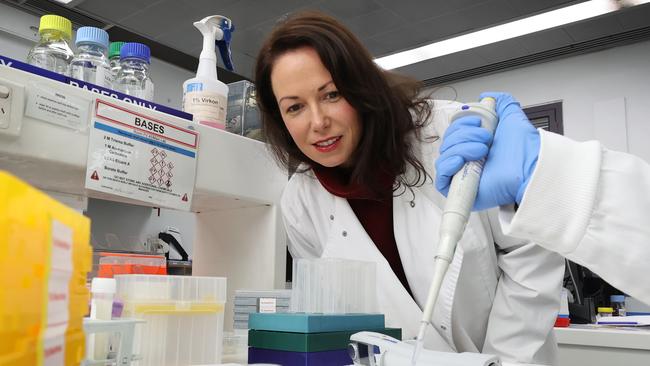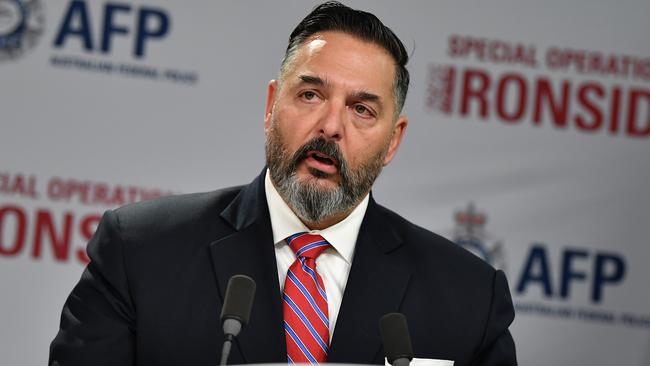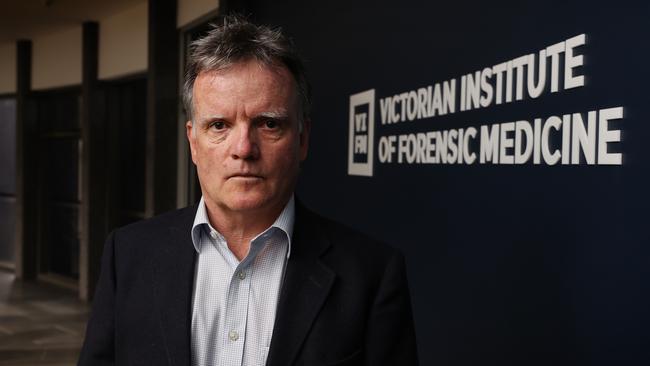FBI technology may soon be used to crack Victorian cold case crimes
Forensic technology used by the FBI to expand DNA profiling may soon be used in Victoria to help solve historic cold cases and nab perpetrators.

Police & Courts
Don't miss out on the headlines from Police & Courts. Followed categories will be added to My News.
Forensic technology used by the FBI to bring down California’s infamous Golden State killer could soon be used in Victoria to crack cold cases and bring perpetrators to justice.
If implemented today, forensic investigative genetic genealogy — commonly referred to as FIGG techniques — could potentially identify more than 20 deceased Victorians whose identity remains unknown.
FIGG is an emerging area of expertise and involves matching DNA samples to a wider familial group for the purposes of narrowing down the search for a criminal suspect or for identifying human remains.
It was most famously used to help solve the Golden State Killer case in California in 2018.
Special agents from the FBI are in Melbourne this week to work alongside the Victorian Institute of Forensic Medicine, Victoria Police and the Australian Federal Police and brief investigators on how to implement the technique.
FBI Legal Attaché Anthony Russo said partnering with Australian agencies was “absolutely crucial to addressing evolving criminal threats”.
Mr Russo said the visit to Victoria would allow FBI agents to exchange their knowledge and expertise in a bid to enhance law enforcement capabilities.

“Genetic genealogy techniques lawfully employed by investigators represent an important innovation that can help law enforcement identify unknown victims, resolve cold cases, and combat violent crime,” he explained.
There are about 100 dead people in Victoria whose identity remains unknown. This methodology could be used for about 20 people, who contain a viable sample.
Dadna Hartman, the manager of the Molecular Biology Laboratory at the Victorian Institute of Forensic Medicine said the FIGG technique is a more expansive DNA profile that would probe wider family connections.
“Our current techniques only lead us to look for immediate family, so parents, children, siblings,” Ms Hartman said.
“FIGG allows us to cast a much wider net where we can potentially look for first, second, third, fourth cousins and relatives that can help us identify our unknown person.”
Ms Hartman said the project is still in its “early stages” but if privacy concerns are addressed, voting, birth and marriage records could be used to narrow down the pool of possible matches.
The program intends to use existing databases such as GEDMatch and Family Tree DNA where people have already uploaded profiles and consented to law enforcement accessing their data.

“We‘re just starting out and learning how we could potentially use it to help our Australian cases, from a criminal point of view, but also from a coronial investigation point of view,” Ms Hartman said.
Victorian Institute of Forensic Medicine director Noel Woodford, who is also chair of Monash University’s forensic medicine department, said the introduction of the new technique will help experts and police solve historic crimes and give families across the state “much needed closure”.
Victoria Police’s Forensic Services Department executive director Rebecca Kogios said the force is “closely following” the development of FIGG.
“Victoria Police is currently not using FIGG in criminal casework as further consultation and policy development is required to establish an appropriate regulatory framework,” Ms Kogios said.
“Where possible, Victoria Police look to work collaboratively with other law enforcement agencies by sharing knowledge and expertise when new forensic and crime solving capabilities are developed.”
Attorney-General Jaclyn Symes said there was “certainly merit” in looking at introducing the technique across Victoria.
“Exploration of genealogy databases for the appropriate purposes can really do some good things — whether it’s about identifying criminals and holding them to account or at least getting closure for families of deceased victims,” Ms Symes said.
“Being able to identify people and put an end to cold cases is pretty important.”




